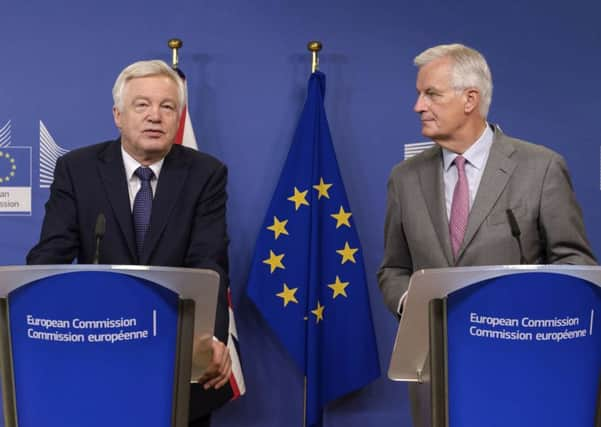UK faces Brexit set-back as tensions flare over '˜divorce bill'


The third round of formal talks with Brussels drew to a close today with a tense exchange between the Brexit Secretary David Davis and the EU’s chief negotiator Michel Barnier.
In a continuation of the highly antagonistic tone that has dominated this week’s meetings, Mr Barnier used the joint appearance to launch a fresh attack on the UK’s position on citizens’ rights and outstanding financial obligations.
Advertisement
Hide AdAdvertisement
Hide AdAnd responding to Mr Davis’ calls for the EU to be more “flexible” in its timetabling for trade talks, he suggested too little progress has been made to justify moving on to a future relationship until a withdrawal settlement has been agreed “during the course of 2018”.
His comments form the latest in a series of highly critical interventions by EU leaders and officials, with the European Parliament’s head negotiator Guy Verhofstadt claiming on Wednesday that progress has been “slow”.
It marks a set back for Theresa May and David Davis, both of whom have expressed optimism that the European Union will agree to move on to discussions about its future relationship with the UK – including trade – by the autumn.
Earlier this year the European Council agreed a set of directives for the formal Article 50 negotiations, including a rule that talks will not be allowed to proceed to the next phase until “sufficient progress has been achieved” on the terms of Britain’s exit. This includes an agreement on the rights of EU and UK nationals, how to manage the border between Northern Ireland and the Republic, and any outstanding payments resulting from commitments such as the latest round of regional development funding.
Advertisement
Hide AdAdvertisement
Hide AdThis so-called divorce bill has proven a key sticking point throughout the Brexit process, with some estimates putting the figure at around £55bn. Speaking to reporters in Brussels, Mr Barnier claimed that no “decisive progress” had been made this week and that it was clear the UK does not feel “legally obliged” to honour its financial obligations after leaving the bloc.
He concluded that the two parties “are quite far from being able to say that sufficient progress has taken place...for me to be able to recommend to the European Council that it engage in discussions on the future relationship between the UK and EU at the same time as we would, during the course of 2018, go on working on finalising the exit and withdrawal agreement,”
However, Mr Davis remained defiant as he criticised the EU in turn for its rigid approach to the talks. He argued that a number of the issues raised can only be resolved “with an eye on how the new partnership between us will work in future”.
He also argued that the UK Government has a “duty to taxppayers” to “interrogate” the EU’s financial demands.
Advertisement
Hide AdAdvertisement
Hide AdThe press conference was followed by a joint appearance by Theresa May and the Japanese Prime Minister Shinzo Abe to mark the end of Mrs May’s visit to the country.
Mrs May announced that the two nation’s had agreed to work “quickly” to establish a new economic partnership after Brexit.
She said both leaders wanted to see a “swift conclusion of the ambitious EU-Japan economic partnership agreement”, and that the UK would be free to sign new bilateral trade agreements in any interim period after Brexit.
““We will set up a new joint working group to examine how we can unblock remaining barriers to trade and take steps to build the closest, freest trading relationship between the UK and Japan after Brexit,” she said.